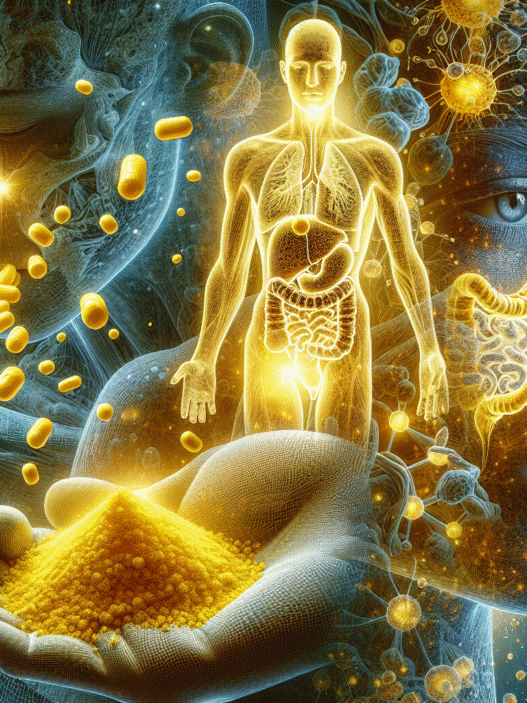Understanding Berberine
Introduction to Berberine
Berberine is a bioactive compound derived from several plants, including Berberis vulgaris. It is classified as an isoquinoline alkaloid and has been used in traditional medicine for over 400 years across regions such as China, India, and the Middle East. Known for its impressive range of health benefits, berberine has gained popularity among those interested in functional medicine and holistic wellness. Its role in supporting berberine and mitochondrial health is of particular interest as it interacts with cellular processes that are crucial for energy production and overall metabolic health.
Mechanism of Action
The primary mechanism through which berberine exerts its effects is by activating an enzyme called AMP-activated protein kinase (AMPK). AMPK plays a key role in regulating metabolism and energy levels within cells. When berberine activates AMPK, it influences various metabolic pathways, promoting energy production while suppressing fat storage. This enzymatic action can lead to numerous health benefits, including improved glucose metabolism and enhanced lipid profiles.
Table 1 illustrates the pathways impacted by AMPK activation:
| Pathway | Effect of Berberine |
|---|---|
| Glycolysis | Increases glucose breakdown |
| Insulin Secretion | Enhances insulin release |
| Gluconeogenesis | Suppresses liver glucose production |
| Lipid Synthesis | Inhibits fat formation |
| Lipid Breakdown | Promotes fat use for energy |
Berberine’s ability to modulate these pathways has demonstrated potential in combating chronic health conditions, including type 2 diabetes and metabolic disorders. For more detailed insights on the benefits of berberine, refer to our article on berberine benefits.
In addition to AMPK activation, berberine also affects other cellular mechanisms that may influence which genes are expressed or silenced. This multifaceted approach contributes to its protective role against various health issues, underlining why individuals are increasingly looking into supplements that contain berberine. To learn more about berberine supplements, visit our page on berberine supplements.
Health Benefits of Berberine
Berberine, a bioactive compound found in several plants, is gaining attention for its numerous health benefits. Its impact on blood sugar regulation, weight loss, and heart health make it a significant topic of interest among those exploring functional medicine and holistic wellness.
Blood Sugar Regulation
Research shows that berberine has a remarkable effect on blood sugar control. In a 2008 study involving individuals with diabetes, participants taking 1 gram of berberine per day experienced a 20% reduction in fasting blood sugar levels. Additionally, there was a notable reduction in hemoglobin A1c (HbA1c) by 12% as well as improved cholesterol and triglyceride levels.
| Measurement | Before Berberine (Average) | After Berberine (Average) | Change (%) |
|---|---|---|---|
| Fasting Blood Sugar (mg/dL) | 150 | 120 | -20% |
| HbA1c (%) | 8.0 | 7.0 | -12% |
| Cholesterol (mg/dL) | 220 | 190 | -13.6% |
| Triglycerides (mg/dL) | 200 | 180 | -10% |
These findings underscore berberine’s potential as a natural supplement for managing blood sugar levels and improving overall metabolic health.
Weight Loss and Metabolism
Another compelling benefit of berberine is its role in weight management. A clinical study found that individuals with obesity who supplemented with 500 milligrams of berberine three times a day lost an average of about 5 pounds over a 12-week period. This weight loss can be attributed to various metabolic changes induced by berberine, including enhanced insulin sensitivity and increased fat oxidation.
| Study Duration | Daily Dose (mg) | Average Weight Loss (lbs) |
|---|---|---|
| 12 weeks | 1500 (500 mg x 3 times) | 5 |
Such results suggest that berberine may act as a beneficial supplement for those aiming to manage their weight alongside a healthy diet and exercise regimen. Additional benefits of berberine can be explored in our article on berberine benefits.
Heart Health Improvement
Berberine has also been linked to improved heart health. It may significantly enhance the lipid profile by lowering cholesterol and triglyceride levels. In the aforementioned study with individuals having diabetes, berberine’s ability to reduce blood lipids can contribute to lowering the risk of cardiovascular diseases (Healthline).
These beneficial effects on heart health make berberine a candidate for promoting overall cardiovascular well-being. For those interested in the broader implications of berberine on health markers, additional information can be found in our discussions on berberine and blood pressure and berberine and kidney function.
In summary, berberine demonstrates a multifaceted impact on health, particularly in its regulation of blood sugar, support for weight loss, and enhancement of heart health, making it an intriguing subject for those following holistic health practices.
Berberine and Chronic Conditions
Berberine is gaining attention for its potential therapeutic effects on chronic conditions, particularly in relation to mental health and liver function. This section explores its roles in depression management and its implications for nonalcoholic fatty liver disease (NAFLD).
Depression Management
Emerging research suggests that berberine may offer benefits for individuals managing depression. Its antidiabetic properties, which include lowering blood glucose levels and enhancing insulin sensitivity, are thought to be linked to improved mood and mental health outcomes (Healthline). Furthermore, berberine can activate AMPK (AMP-activated protein kinase), a key regulator in the body’s energy metabolism, which may positively influence mood by improving metabolic health (PubMed Central).
| Mechanism | Effect on Depression |
|---|---|
| Lowers Blood Glucose Levels | May enhance mood stabilization by improving blood sugar regulation |
| Increases Insulin Secretion | Potentially supports better neurotransmitter balance |
| Activates AMPK | Could improve energy metabolism related to mood regulation |
Nonalcoholic Fatty Liver Disease
Berberine has also shown promise in managing nonalcoholic fatty liver disease (NAFLD), a chronic condition linked to obesity and metabolic syndrome. Its ability to improve lipid profiles and facilitate weight loss can help reduce liver fat accumulation. Studies indicate that berberine may lower cholesterol levels and enhance liver function, making it a potentially effective treatment option for individuals with NAFLD.
Berberine’s role in mitochondrial health further complements its benefits in managing NAFLD. By improving mitochondrial function and promoting processes like mitophagy, berberine helps optimize metabolic processes within liver cells, which is critical for reversing fatty liver conditions.
| Effects of Berberine on NAFLD | Mechanisms |
|---|---|
| Lowers Cholesterol Levels | Reduces liver fat accumulation |
| Improves Insulin Sensitivity | Supports better metabolic health |
| Enhances Mitochondrial Function | Promotes the health of liver cells |
For those interested in harnessing the benefits of berberine for chronic conditions, it can be explored further through various berberine supplements and lifestyle changes aimed at improving overall well-being.
Interaction with Medications
The use of berberine can have significant interactions with certain medications, affecting their efficacy and safety. Understanding these interactions is critical for those considering adding berberine to their health regimen.
Impact on Blood Sugar Levels
Berberine is known for its ability to lower blood sugar levels. When combined with diabetes medications, there is a risk that blood sugar may drop to dangerously low levels. Monitoring blood sugar levels closely is essential when using berberine along with antidiabetes drugs (WebMD).
| Medication Type | Effect of Combining with Berberine |
|---|---|
| Antidiabetic Medications | Increased risk of hypoglycemia (low blood sugar) |
Effects on Blood Clotting
Berberine has been found to slow down blood clotting. This effect raises concern when it is taken alongside medications that also have anticoagulant or antiplatelet properties. The combined effect may increase the risk of bruising and bleeding, necessitating caution with this combination.
| Medication Type | Effect of Combining with Berberine |
|---|---|
| Anticoagulants/Antiplatelet Drugs | Increased risk of bruising and bleeding |
Liver Processing Interactions
Berberine can influence how the liver processes certain medications. It may alter the speed at which the liver metabolizes drugs, potentially changing their effects and side effects. This interaction emphasizes the importance of careful monitoring and possible adjustment of medication doses when berberine is included in a treatment plan.
| Medication Type | Effect of Combining with Berberine |
|---|---|
| Liver-Metabolized Medications | Potential alteration of effects and side effects |
Using berberine effectively requires an understanding of its interactions with various medications, especially for those managing chronic conditions. For more detailed insights on the full range of berberine’s health benefits, refer to our article on berberine benefits.
Berberine and Mitochondrial Health
Berberine has garnered attention for its potential role in enhancing mitochondrial health, particularly in relation to conditions like diabetic encephalopathy. This section explores its effects on mitochondrial function and the implications for overall health.
Role in Diabetic Encephalopathy
Berberine may help alleviate symptoms of diabetic encephalopathy by positively influencing mitochondrial health. Studies indicate that berberine treatment increases mitochondrial membrane potential (MMP) while simultaneously decreasing reactive oxygen species (ROS) levels in rat models. This effect suggests that berberine could counteract mitochondrial dysfunction associated with diabetes.
The Rho/ROCK pathway appears to play a crucial role in this process. Activation of this pathway can reverse the beneficial effects of berberine on MMP and ROS, highlighting the significance of berberine’s inhibitory action on this pathway in modulating mitochondrial health.
Influence on Mitochondrial Membrane Potential
The enhancement of mitochondrial membrane potential (MMP) is vital for optimal cellular energy production and overall metabolic health. Berberine’s ability to improve MMP serves to bolster mitochondrial function, which is crucial for those suffering from chronic conditions like diabetes. Research indicates that berberine acts through specific pathways, ensuring the maintenance of healthy mitochondrial dynamics and energy balance within cells.
A summary of berberine’s impact on MMP is listed below:
| Effect | Description |
|---|---|
| Increase in MMP | Supports energy production and metabolism of cells |
| Modulation of Pathways | Regulates Rho/ROCK pathway to enhance mitochondrial function |
Effect on Reactive Oxygen Species Levels
High levels of reactive oxygen species (ROS) are often linked to oxidative stress and cellular damage, particularly in the context of diabetic complications. Berberine’s capacity to reduce ROS levels is critical for maintaining mitochondrial integrity and reducing oxidative damage.
A table demonstrating berberine’s effects on ROS levels is provided below:
| Measurement | Result |
|---|---|
| Reduction in ROS Levels | Indicates decreased oxidative stress, yielding protection against mitochondrial dysfunction |
In conclusion, the insights gained regarding berberine and mitochondrial health underscore its potential role in supporting metabolic functions and addressing complications associated with chronic conditions. For more information on the general health benefits of berberine, refer to our article on berberine benefits.
Clinical Evidence and Applications
Berberine has gained attention for its various health benefits, particularly in relation to diabetes and metabolic disorders. Research has established its effectiveness in these areas, along with its potential antimicrobial properties.
Antidiabetic Properties
Berberine’s antidiabetic effects have been well-documented. It has been used in traditional medicine for over 400 years in regions like China, India, and the Middle East. Its mechanism includes reducing blood glucose levels, increasing insulin secretion, and improving glucose tolerance through the activation of the AMPK pathway.
Clinical studies show that berberine supplementation can lead to significant improvements in diabetes control, including:
| Measurement | Effect |
|---|---|
| Fasting Blood Sugar | Reduced by 20% |
| HbA1c Levels | Decreased by 12% |
| Lipid Profiles | Improved |
Research indicates that berberine can also influence glycolysis while suppressing hepatic gluconeogenesis, leading to decreased weight gain in type 2 diabetes patients.
Metabolic Disorder Management
Berberine has shown promise in managing a range of metabolic disorders beyond diabetes. It can effectively reduce triglycerides, total cholesterol, low-density lipoprotein (LDL), and fasting plasma glucose levels. This is particularly beneficial in patients facing complications from diabetes, including hyperlipidemia.
The results confirm that berberine acts on various metabolic pathways, providing a multi-faceted approach to treating metabolic disorders.
| Metabolic Marker | Effect |
|---|---|
| Triglycerides (TG) | Reduced |
| Total Cholesterol (TC) | Reduced |
| Low-Density Lipoprotein (LDL) | Reduced |
| Fasting Plasma Glucose (FPG) | Reduced |
| Homeostasis Model Assessment-Insulin Resistance (HOMA-IR) | Improved |
Antimicrobial Applications
In addition to its role in managing metabolic conditions, berberine has also been explored for its antimicrobial properties. Studies suggest that this isoquinoline alkaloid demonstrates effectiveness against a range of pathogens, contributing to its comprehensive health benefits. While the depth of research in this area is still developing, its potential as an antimicrobial agent offers additional avenues for health promotion, specifically in supporting the immune system and combating infections (NCBI).
For further information on how berberine supports overall health, consider exploring topics like berberine benefits or its interaction with specific bodily functions, such as berberine and gut health and berberine and immune system.





















